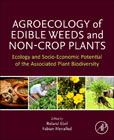
Agroecology of Edible Weeds and Non-Crop Plants: Ecology and Socio-Economic Potential of Plant Biodiversity
Ebel, Roland
Menalled, Fabian
Agroecology of Edible Weeds and Non-Crops: Ecology and Socio-Economic Potential of Plant Biodiversity is the first book to move beyond the ethnobotanical aspect of under-utilized non crops to explore how to optimize their potential. With case studies of edible weeds and non-crop plants from around the world, including Europe and North America, in urban as well as rural settings, the book highlights the global opportunities provided by these plants. The book includes much needed information for identifying, maintaining, and benefitting from these plant species. It is ideal for agricultural professionals, educators, researchers, and students. Those interested in increasing the diversity of the farming landscape and food systems by means of edible non-crop plants have access to a plethora of information on the ethnobotany of these species. Yet little to no information exists on the agroecological requirements and potential benefits of underutilized edible non-crop plants in the context of sustainable farming systems. This book fills that knowledge gap from identifying edible weeds and non-crop plants, to exploring the ways these plants can be used to economically improve nutrition. Evaluates ecological processes underpinning the abundance and diversity of edible non-crop plantsAssesses ecological benefits of these species within agroecosystemsIdentifies socioeconomic barriers and incentives in exploiting consumable agricultural biodiversityHighlights real-world insights through case studies INDICE: 1. Introduction: Edible weeds. A need for an agroecological perspective2. Agroecology of edible weedsEcological principles in the study of edible weedsBiogeography of edible weedsManagement practices to enhance the abundance of edible weeds within different agricultural landscapesEcological, cultural, and socioeconomic criteria for diversifying weed use as foodImpact of edible weeds on other components of the associated biodiversity3. Economic and social implications of edible weedsEdible weeds as a component of a resilient food systemWeeds as a social constructThe economy of edible weeds Teaching sustainable food systems: edible weeds as a learning tool.Nutrition-sensitive agroecology highlights the importance of wild foods1. Case studies: agroecology of edible weeds in industrialized and developing regionsEdible weedy plants for food security and sovereignty in NW PatagoniaFlixweed: a weed, a cover crop, an edible plant“Quelites”: The culture of edible weeds in MexicoAgroecological systems and edible weeds in NepalThe agroecology of edible weeds in AfricaEdible weeds of the Caribbean: agroecology and useEdible weeds in different agroecological mulching systems in Piedmont, NW ItalyAgroecology and use of edible weeds among Native AmericansItajetik: Food culture and agroecology of edible weeds from the Tseltal Maya milpa in northern ChiapasVisualizing for advocacy: the role of non-cultivate species in highlands communities in VeracruzAgroecology of edible weeds in IndiaEdible weeds: a case study from Solomon IslandsEcology of edible weeds in urban settings and social perception of weeds as food2. Looking forwards: approaches to foster ecological management of edible weeds and promote the persistence of diverse agroecosystems and foods
- ISBN: 978-0-443-16076-9
- Editorial: Academic Press
- Encuadernacion: Rústica
- Páginas: 300
- Fecha Publicación: 01/10/2024
- Nº Volúmenes: 1
- Idioma: Inglés
